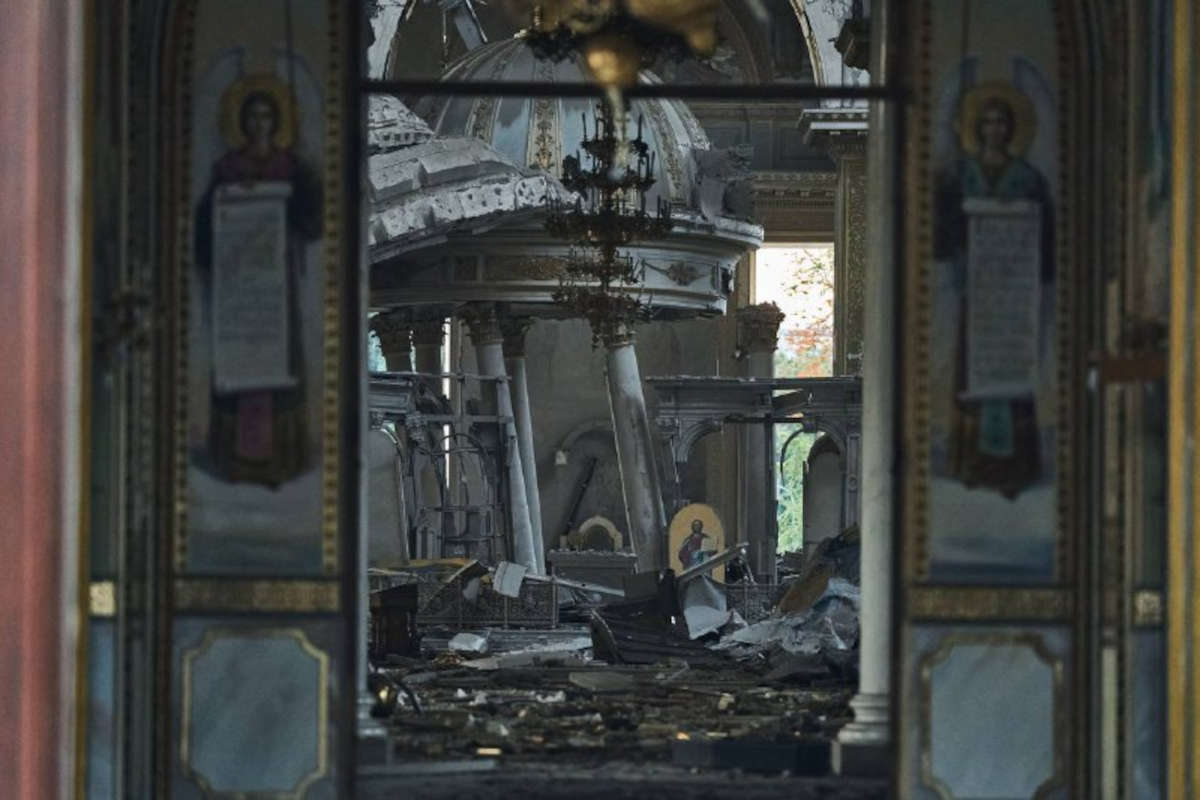Get Russia out of ICOM, or the International Council of Museums , the world’s leading representative body for museums : calling for this is a French nonprofit association, “Pour l’Ukraine, pour leur liberté et la nôtre,” which published an open letter in the newspaper Le Monde. The association, represented by analyst Christian Castagna, a specialist in European and international affairs, is working, in particular, on the issue of cultural property devastated during these three years of the war that Russia began on Feb. 24, 2022: to date, the association recalls, UNESCO has counted 494 sites destroyed or damaged since the beginning of the war, including 149 religious buildings, 257 historic buildings, 33 monuments (including Holocaust memorials), 18 libraries, 34 museums, and 2 archaeological sites.
“However,” the letter reads, “Moscow’s goal is not only destruction. It is also about appropriating Ukrainian heritage, ’Russifying’ it whenever possible. Since the occupation of Crimea in February 2014 , a systematic policy of redefining cultural identity has been implemented. Thousands of works of art are being transferred from Crimean museums to Russian institutions.” The association also lists some examples: for example, the major exhibition on Ivan Aivazovsky held in 2016 at the Tret’jakov Gallery in the exhibition, where 38 out of the 120 works on display came from the collections of Russian-occupied Crimea . Also, the dismantling of the Chersonese archaeological site, one of seven UNESCO World Heritage Sites in Ukraine, on which a museum entitled “Museum of Crimea and Novorossiya” (New Russia) was also installed in July 2024 to justify Russian claims of “reconquest” of Ukraine’s eastern and southern regions.
“These systematic lootings,” the association explains, “respond to a clear political agenda: to realize the imperial fantasy of a ’Greater Russia’”; a vision that has been enshrined in law in Russia through the Duma vote on constitutional amendments legitimizing the annexation of Crimea and four oblasts of Ukraine (Donetsk, Lugansk, Cherson and Zaporizhia). And then, in May 2023, “Methodological Recommendations for the Creation of Exhibitions Dedicated to the History of the ’Special Military Operation’ in the Museums of the Russian Federation” were also published, which were almost immediately implemented by the directors of Russian museums, especially in institutions “twinned” with museums located in the occupied territories. This means that museum staff in the so-called Novorossiya are being trained (as in Rostov-on-Don in October 2024) to “re-catalogize” Ukrainian collections in the Russian museum system and align their cultural programming with the Kremlin’s historical revisionism. “Today,” the association says, “the collections of 77 Ukrainian museums in the occupied territories are included in the State Catalogue of the Museum Fund of the Russian Federation.”

However, such acts “constitute violations of international law, in particular the 1954 Hague Convention for the Protection of Cultural Property in the Event of Armed Conflict, to which Russia is a signatory. The arguments for legal responsibility are strong. Evidence abounds and some perpetrators have personally documented their crimes.” Moreover, says Pour l’Ukraine, “several Russian museum directors have been identified as accomplices; one of the most outspoken is Mikhail Piotrovsky, director of the Hermitage in St. Petersburg, who ideologically justified the looting. It is to be hoped that the application of international law will one day allow these crimes to be condemned and the stolen property to be returned. But legal action can take decades. Meanwhile, Russian art dealers are already re-establishing ties with collectors at major international fairs, particularly in Maastricht.”
For these reasons, the association calls forRussia’s expulsion from ICOM: “Urgent measures are needed and concrete decisions can be taken immediately: expel Russia from the International Council of Museums (ICOM) and Russian museum personnel involved in the looting of Ukrainian collections in the occupied territories. Article 7.2 of the ICOM Code of Ethics clearly states, ’Museum policy must take into account international legislation that serves as a standard for the interpretation of the ICOM Code of Ethics.’”
“The continued presence within ICOM of institutions and individuals involved in the destruction, looting, and forgery of cultural heritage is a flagrant violation of these principles,” Pour l’Ukraine concludes. “Expelling Russia from ICOM is the least that can be expected from an institution under French law, dedicated to the protection of cultural heritage and the application of ethical standards in international museum cooperation. Many national committees have already requested this sanction, so far without success. Will it be necessary for the French courts to force ICOM to abide by its own rules?”
Among the signatories to the letter are several experts: curator Kostantin Akinsha, and then Francesca Thyssen Bornemisza founder of “Museums for Ukraine,” and Vitalit Tytych, head of legal affairs of ICOM’s Ukrainian section. At the moment, ICOM has not yet responded.
 |
| Russia out of ICOM: association calls for expulsion |
Warning: the translation into English of the original Italian article was created using automatic tools. We undertake to review all articles, but we do not guarantee the total absence of inaccuracies in the translation due to the program. You can find the original by clicking on the ITA button. If you find any mistake,please contact us.